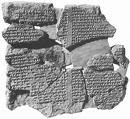 Though it existed thousands of years before Judaism, Christianity and Islam, there’re amazing parallels between
Though it existed thousands of years before Judaism, Christianity and Islam, there’re amazing parallels between1. Are the three religions accounts, regardless of difference in narration, genuine?, 2. Did the Mesopotamian account, on one hand, and Judaism, Christianity and Islam’s accounts, on the other hand, stem from more ancient religion of which we knew nothing yet?, and 3. Have the three religions just borrowed from the Mesopotamian accounts?
Well, let us see what the possibilities are:
1. The Hebrews borrowed from their neighbors: This is the idea put forth by most scholars. Chronologically the Hebrews could have known about the Sumerian myths via Abraham and Babylonian through trade. The theory made sense originally; unearthed ancient clays tablet describing the creation of the universe and man.
2. The Sumerians, Babylonians, Egyptians, etc. borrowed from the Hebrews: This explanation is highly unlikely because the Sumerian myths have older roots. The Babylonians did borrow from the Sumerians and their myths were written, including the Enuma Elish. As for the Egyptians, some myths are obviously much older than Genesis while some are definitely newer. The Hebrews did not influence their neighbor's religious thought in any meaningful and lasting way.
3. All ancient Near East myths sprang from an older source, in this case older myths: This theory actually makes a lot more sense than the idea of the Hebrews borrowing from their neighbors. A few scholars do, such as Prof. Ira Price who attributes the similarities to "a time when the human race occupied a common home and held a common faith. Is it possible that all of the ancient myths memories are from a Neolithic past? If so, then the most ancient myths should be the most accurate and subsequent civilization's myths would invariably be corrupted by time and language. This is an intriguing possibility.
4. The various myths are corrupted versions of actual events, instead of older myths: This theory postulates that the events in Genesis actually happened as described. That would mean that the oldest myths (Sumerian) are again more accurate as they were written closest to the time of the events. Nevertheless, they were still be corrupted by polytheism.
Having read the Jewish Bible, the Christian Bible, the Qur'an and the Mesopotamian and Ancient Egyptian mythology at an early age, and finding amazing parallels, I started wondering if we could really make a link. My wondering at that time was firstly based on linguistic ground; example: Some of the words which we still use today are found in the Mesopotamian vocabulary; some with slight differences, but can be traced back to languages spoken by Mesopotamian. Some of these words are: 1. The word "Amen" in most current languages sounds like the name of the Ancient Egyptian God "Amen/Amon". 2. The Arabic word “Ardh”, meaning 'Earth', and “Eredz’' in Hebrew, and 'Earth' in English sounds like 'Aridu' which is the name of the first city built in Mesopotamia. 3. The word “Eden” in English and 'Adn' in Arabic, sounds like the Mesopotamian ‘Eden’, which is a place where the first Adam was created. 4. The word “Adam” in English and Arabic and many other languages sounds like the Mesopotamian 'Adam', or 'Adama'. 5. The word “Utoon” in Arabic, meaning 'fire', or 'Oven' sounds like the name of the Ancient Egyptian God 'Aton'. The English verb“Atone” sounds like a derivative of the same word. 6. The word "Mami" or "Mama" in many languages sounds like the nickname of the womb Goddess who carried the first created man in her womb.
It is also woth mentioning that the first phoneme 'M' in the word ‘mother’ is common in words for mother in many languages; 'uM' in Arabic, 'Mother' in English, 'mère' in French, 'Mutter' in German and Sanskrit, etc.
http://www.ancientdays.net/creationstories.htm, http://www.sitchin.com/

Here is an important link: http://www.sitchin.com/
ReplyDelete